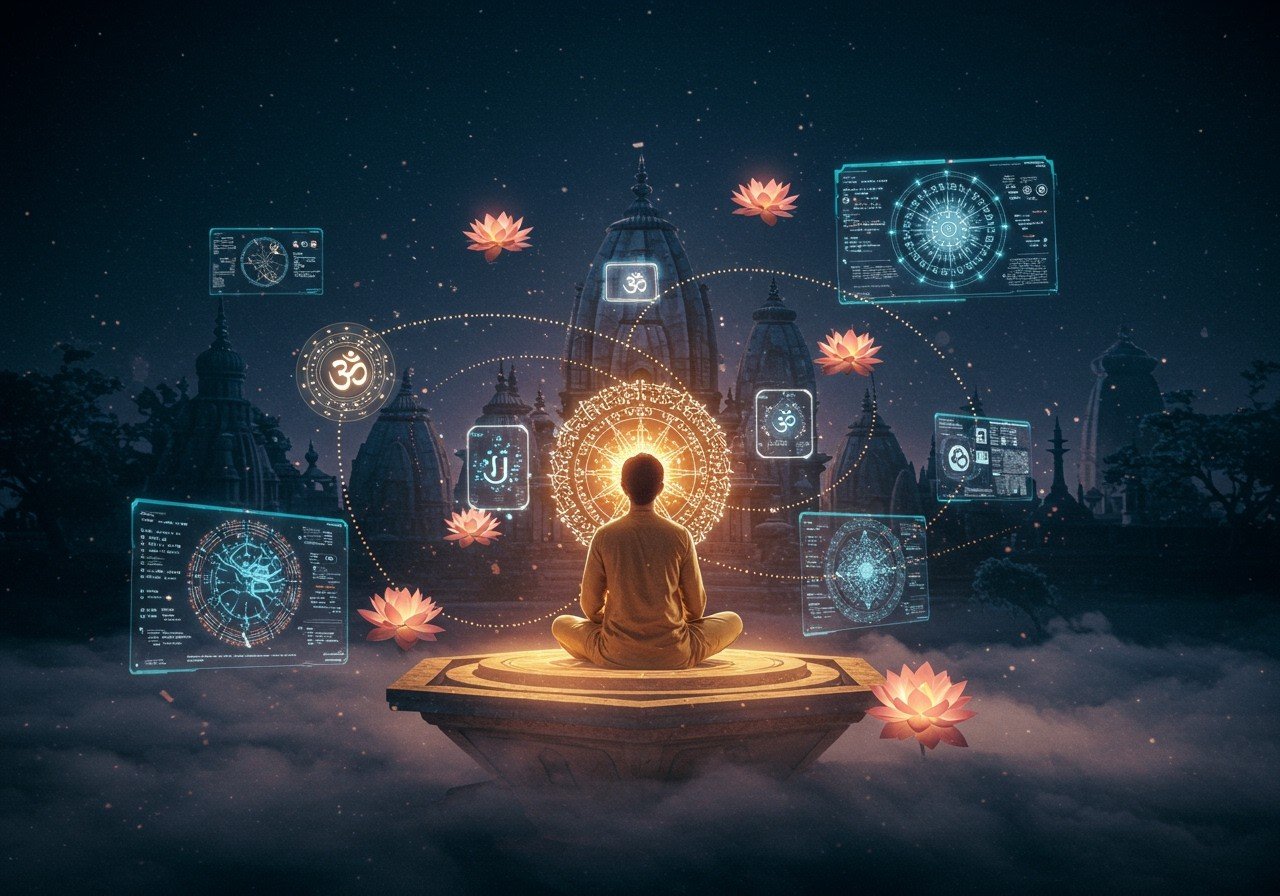
Contemporary Indian philosophy represents a fascinating evolution of thought, blending ancient wisdom with modern perspectives. It’s a journey into how traditional Indian philosophical concepts have adapted to the complexities of the 21st century, addressing contemporary issues and global contexts. This exploration is crucial for those seeking intellectual growth and a deeper understanding of their cultural heritage.
What is Contemporary Indian Philosophy?
Contemporary Indian philosophy encompasses the intellectual movements and philosophical discourse that have emerged in India since the early 20th century. It’s characterized by the integration of traditional Indian thought with modern-day issues and global ideas. This dynamic interplay creates a unique philosophical landscape that tackles the challenges of our times while drawing inspiration from a rich historical past.
- Definition: Contemporary Indian philosophy represents a dynamic blend of ancient traditions and modern challenges. It draws from both orthodox systems (Nyaya, Vaisheshika, Samkhya, Yoga, Purva-Mimamsa, and Vedanta) and unorthodox systems (Buddhism and Jainism), offering a multifaceted perspective.
- Historical Impact: Significant historical events, such as the Indian independence movement, have profoundly shaped contemporary Indian philosophy. Thinkers like Mahatma Gandhi, with his emphasis on ahimsa (non-violence) and Satyagraha, have left a lasting impact on the philosophical discourse.
- Global Influence: Globalization and technology play a crucial role in shaping modern philosophical discussions. Indian philosophy has made significant contributions to various fields, including psychology, science, ethics, and spirituality, influencing global thought.
- Western Ideas: Contemporary Indian philosophy engages with Western philosophical ideas, creating a rich dialogue between different traditions. This fusion allows for unique approaches to addressing modern issues.
- Key Themes: Key themes explored within contemporary Indian philosophy include secularism, democracy, social justice, environmental sustainability, and human rights. These themes reflect the concerns and aspirations of modern India.
- Examples: Contemporary Indian philosophical works often address current social and political issues, offering innovative solutions rooted in traditional wisdom. They draw inspiration from ancient texts like the Vedas, Upanishads, Bhagavad Gita, and Buddhist scriptures.
Major Themes in Contemporary Indian Philosophy
Contemporary Indian philosophy delves into a wide range of themes relevant to modern India and the world:
- Secularism: Philosophical arguments supporting a secular state and society are central to contemporary Indian thought, emphasizing respect for India’s diverse religious landscape. This involves navigating the complex relationship between religion and politics in a pluralistic nation.
- Democracy: Contemporary philosophers have significantly shaped the understanding and practice of democracy in India. They explore the challenges and opportunities of democratic governance in a diverse and rapidly changing society.
- Social Justice: Issues of caste, gender, and economic inequality are critically examined. Philosophers advocate for social justice and equality, seeking solutions to deep-rooted societal problems.
- Environmental Ethics: Indian philosophers contribute to global discussions on environmental sustainability and the ethical treatment of nature. They emphasize the interconnectedness of all beings and the importance of ecological balance.
- Human Rights: Contemporary Indian thought has influenced the understanding and advocacy of human rights. Philosophers champion the dignity and equality of all individuals, promoting a just and humane society.
- Technology and Modernity: Philosophers grapple with the implications of rapid technological advancements on Indian society and culture. They explore the ethical and social dimensions of technology, seeking to harness its potential for good.
- Education and Philosophy: The role of philosophy in shaping educational policies and practices is a key concern. Philosophers advocate for an education system that fosters critical thinking, creativity, and holistic development.
Influential Thinkers in Contemporary Indian Philosophy
Several prominent thinkers have shaped the landscape of contemporary Indian philosophy:
- Dr. B.K. Lal: Known for his significant contributions to modern Indian philosophy, Dr. Lal’s works explore contemporary issues through the lens of traditional thought. His writings offer valuable insights into the intersection of ancient wisdom and modern challenges.
- Jiddu Krishnamurti: Krishnamurti’s teachings emphasize education, freedom, and human consciousness. He encouraged individuals to question established beliefs and seek their own truth. His work continues to inspire self-discovery and personal transformation.
- Amartya Sen: Sen’s contributions to social justice, welfare economics, and human rights are widely recognized. He emphasizes the importance of equality, fairness, and human capabilities in achieving a just and prosperous society.
- Vandana Shiva: Shiva is a leading voice in environmental ethics and sustainable development. Her work advocates for ecological balance and challenges unsustainable practices. She champions the rights of nature and the importance of biodiversity.
- Gayatri Chakravorty Spivak: Spivak is known for her work in postcolonial theory and feminist philosophy. She addresses issues of identity, power dynamics, and social justice, offering critical perspectives on the legacies of colonialism.
- Rajneesh (Osho): Osho’s teachings focus on spirituality, meditation, and the human mind. His philosophy promotes inner peace, self-awareness, and a deeper understanding of human consciousness.
Poojn.in: Your Resource for Contemporary Indian Philosophy
Poojn.in, India’s leading online store for cultural and spiritual goods, supports your exploration of contemporary Indian philosophy. We offer a wide selection of products and resources that connect you with the rich traditions and practices of Indian spirituality.
- Explore the wisdom of the Ramayana: Delve into the epic tale and its timeless lessons with our curated collection of books, art, and devotional items. Discover the characters, themes, and philosophical insights of the Ramayana at Hanuman’s Journey: Devotion, Strength, and Epic Tale, Lord Rama: Ideal Leadership and Virtue, and Ramayana Characters and Life Lessons.
- Deepen your understanding of Hindu philosophy: Explore the core principles and concepts of Hinduism with our informative resources and authentic puja items. Learn more about Hindu symbols and their significance at Hindu Philosophy Explained: A Beginner’s Guide and Hindu Symbols Explained: Their Meanings and Importance.
- Enhance your spiritual practice: Find everything you need for your daily puja and spiritual rituals, from incense and diyas to idols and scriptures. Browse our extensive collection of high-quality puja items at Falcon Brand Indian Sandal Incense Sticks and Laddu Gopal Brass Murti.
Conclusion
Contemporary Indian philosophy continues to evolve, engaging with new challenges while staying deeply rooted in its rich traditions. The contributions of these influential thinkers ensure that this vibrant intellectual legacy remains relevant and impactful in the 21st century. By exploring contemporary Indian philosophy, we gain valuable insights into ourselves, our society, and our place in the world.


